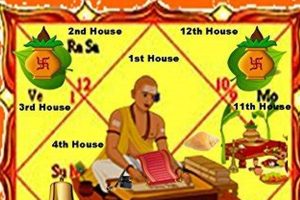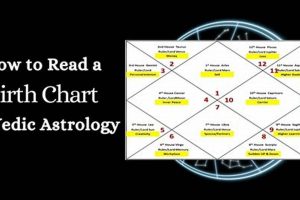Jyotisha, the traditional Hindu system of astrology, and Western astrology represent distinct approaches to understanding celestial influences on human lives. Jyotisha emphasizes a fixed zodiac based on constellations, focusing on the individual’s karma and dharma, while Western astrology commonly employs a tropical zodiac based on the seasons, often exploring psychological traits and potential.
Comparing these systems provides valuable insights into diverse cultural perspectives on cosmology and self-understanding. Jyotisha offers a framework for understanding one’s life purpose and karmic influences, potentially offering guidance for spiritual growth. Western astrology often facilitates self-discovery through personality analysis, potentially fostering greater self-awareness and personal development. Both systems have ancient roots, Jyotisha arising from Vedic traditions and Western astrology evolving through Greek, Egyptian, and Babylonian influences.
This exploration will delve into the core differences between these systems, examining their distinct zodiacs, planetary interpretations, predictive techniques, and philosophical underpinnings. This comparative analysis will offer a clearer understanding of the strengths and limitations of each approach, ultimately empowering individuals to determine which system resonates most strongly with their personal beliefs and goals.
Understanding Astrological Systems
Navigating the diverse landscape of astrological traditions can be challenging. The following tips offer guidance for approaching both Jyotisha and Western astrology with discernment.
Tip 1: Research the Underlying Philosophies: A deep understanding of the philosophical foundations of each system is essential. Explore the concepts of karma and dharma in Jyotisha, and the emphasis on psychology and archetypes in Western astrology.
Tip 2: Consider the Zodiac System: Recognize the fundamental difference between the sidereal zodiac used in Jyotisha and the tropical zodiac used in Western astrology. This distinction significantly impacts planetary placements and interpretations.
Tip 3: Consult Qualified Practitioners: Seek guidance from experienced and reputable practitioners within each tradition. A qualified astrologer can provide personalized insights based on the specific system.
Tip 4: Approach Predictions with Critical Thinking: Astrological interpretations offer potential insights, not definitive pronouncements. Maintain a discerning perspective and avoid making life decisions solely based on astrological predictions.
Tip 5: Explore Different Branches within Each System: Both Jyotisha and Western astrology encompass various specialized branches, such as natal astrology, predictive techniques, and relationship analysis. Exploring these sub-disciplines can provide a more comprehensive understanding.
Tip 6: Focus on Self-Discovery and Growth: Utilize astrological insights as tools for self-reflection and personal development. Whether exploring karmic patterns or psychological tendencies, astrology can facilitate greater self-awareness.
By understanding the core principles and approaching each system with a critical yet open mind, individuals can gain valuable insights into their lives and potential.
Ultimately, the choice between Jyotisha and Western astrology depends on individual resonance and personal beliefs. Further exploration of specific techniques and applications within each system will offer a deeper appreciation for their unique contributions.
1. Zodiac Systems
A core distinction between Vedic and Western astrology lies in their respective zodiac systems. Vedic astrology utilizes the sidereal zodiac, a fixed system based on the observable constellations. Western astrology predominantly employs the tropical zodiac, measured from the Earth’s vernal equinox. This fundamental difference results in a roughly 24-degree variance between planetary placements in the two systems. For example, someone with the Sun at 10 degrees of Aries in the tropical zodiac might have the Sun at approximately 16 degrees of Pisces in the sidereal zodiac. This shift impacts interpretations, as the signs themselves hold different meanings within each tradition. The sidereal zodiac emphasizes the astronomical positions of constellations, while the tropical zodiac aligns with the Earth’s seasonal cycle.
The choice of zodiac system affects the core astrological interpretation. In Vedic astrology, the sidereal placement emphasizes the individual’s karmic journey and connection to cosmic energies. The tropical zodiac, used in Western astrology, is interpreted through the lens of psychological archetypes and seasonal influences. Consider a person born when the Sun is conjunct the fixed star Regulus. In the sidereal system, this conjunction would likely be interpreted through the lens of the constellation Leo’s fixed nature. In the tropical system, if the Sun has moved into Virgo due to precession, the interpretation might focus on themes of service and detail-orientedness. The practical significance of this difference lies in the varying perspectives offered by each system regarding an individual’s strengths, challenges, and life path.
In summary, understanding the divergent zodiac systems is crucial for navigating the differences between Vedic and Western astrology. Recognizing the implications of the sidereal and tropical zodiacs provides context for the diverse interpretations and predictions offered by each tradition. This awareness allows individuals to engage with astrology more critically, fostering a deeper appreciation for the unique insights provided by both systems.
2. Planetary Interpretations
Planetary interpretations constitute a significant point of divergence between Vedic and Western astrology. While both systems utilize the same planets, their assigned meanings and roles differ considerably, reflecting the distinct philosophies underlying each tradition. Understanding these variations is essential for grasping the broader implications of choosing one system over the other.
- Rulership and Dignity
Planetary rulership and dignity are conceptualized differently. In Western astrology, each planet “rules” a specific zodiac sign, imbuing it with certain characteristics. Mars, for example, rules Aries and Scorpio. Vedic astrology incorporates a more nuanced system of planetary dignities, including exaltation, debilitation, and moolatrikona signs, adding layers of complexity to planetary influences. A planet in its sign of exaltation, like Jupiter in Cancer, is considered highly auspicious, while a debilitated planet, like Venus in Virgo, is thought to function less effectively.
- Lunar Nodes (Rahu and Ketu)
Vedic astrology gives significant importance to the lunar nodes, Rahu (North Node) and Ketu (South Node), considered shadow planets influencing karmic patterns. These nodes are not typically emphasized in Western astrology, representing a key difference in the systems’ approaches to fate and destiny. Rahu is often associated with ambition and desires, while Ketu represents past-life experiences and spiritual detachment.
- Planetary Periods (Dashas)
The concept of planetary periods, known as dashas, is central to Vedic astrological predictions. Each dasha represents a specific time frame governed by a particular planet, influencing the individual’s experiences during that period. This structured system of time measurement is not a standard feature of Western astrology, which focuses more on transits and progressions. Understanding the influence of specific dashas provides a framework for interpreting life events within a Vedic context.
- Emphasis on Nakshatras (Lunar Mansions)
Vedic astrology incorporates nakshatras, or lunar mansions, dividing the zodiac into 27 segments, each with unique qualities and associated deities. This provides a more granular level of analysis than typically found in Western astrology, offering further insight into personality nuances and karmic influences. Nakshatras provide a framework for understanding specific life themes and the timing of significant events.
These divergent interpretations of planetary influences contribute significantly to the contrasting approaches of Vedic and Western astrology. While Western astrology often focuses on psychological archetypes and personal growth, Vedic astrology emphasizes karmic patterns and the unfolding of destiny. Recognizing these core differences allows individuals to choose the system that aligns most closely with their worldview and desired level of astrological insight.
3. Predictive Techniques
Predictive techniques constitute a major point of divergence between Vedic and Western astrology, offering distinct approaches to forecasting future trends and events. Vedic astrology emphasizes planetary periods (dashas), transits based on the sidereal zodiac, and various specialized charts like the divisional charts (vargas). Western astrology primarily utilizes transits based on the tropical zodiac, progressions, and solar return charts. These contrasting methodologies lead to different perspectives on the timing and nature of potential life events.
Dashas, a cornerstone of Vedic prediction, provide a timeline of planetary influences based on mathematical cycles. For example, a person experiencing a Jupiter dasha may encounter opportunities for growth and expansion, while a Saturn dasha might bring challenges and lessons related to discipline and responsibility. Western predictive techniques, focusing on transits and progressions, analyze the ongoing movement of planets and their angular relationships to natal positions. A transit of Saturn over a natal Sun might signify a period of increased responsibility or limitations. Divisional charts in Vedic astrology provide specialized insights into specific areas of life, such as career, relationships, or health. In contrast, Western techniques like solar returns analyze yearly cycles based on the Sun’s return to its natal position.
The practical significance of these divergent predictive methods lies in the unique perspectives they offer. Vedic astrology’s dasha system provides a structured framework for understanding karmic unfoldment and the timing of significant life events. Western transits and progressions offer insights into potential challenges and opportunities based on current planetary cycles. Integrating these distinct approaches can provide a broader understanding of astrological influences. However, it is essential to recognize that astrological predictions offer probabilities, not certainties. Discernment and critical thinking remain crucial when interpreting astrological forecasts.
4. Philosophical Basis
The philosophical underpinnings of Vedic and Western astrology represent a fundamental divergence, shaping their respective interpretations and applications. Vedic astrology, rooted in the ancient Vedic scriptures of India, emphasizes the concepts of karma, reincarnation, and dharma (life purpose). This karmic framework suggests that present circumstances are influenced by past actions and that astrological insights can guide individuals toward fulfilling their dharma. Western astrology, influenced by Hellenistic and Renaissance philosophies, often focuses on psychological archetypes, free will, and personal growth. This perspective emphasizes understanding personality dynamics and utilizing astrological insights for self-awareness and development. For instance, while Vedic astrology might attribute a challenging period to karmic debts, Western astrology might interpret the same period as an opportunity for psychological transformation. Consider an individual facing career setbacks. A Vedic astrologer might analyze the individual’s birth chart and dashas to identify karmic patterns influencing the career challenges. A Western astrologer might focus on transits and planetary aspects to understand the psychological pressures and potential growth opportunities presented by the situation.
The practical significance of understanding these philosophical differences lies in choosing an astrological system that aligns with one’s worldview. Individuals seeking a framework that incorporates karmic principles and spiritual growth might find resonance with Vedic astrology. Those prioritizing psychological understanding and personal empowerment might gravitate towards Western astrology. Furthermore, recognizing these differing philosophies can facilitate more productive cross-cultural dialogue and appreciation for the diverse approaches to astrological interpretation. For example, understanding the concept of dharma in Vedic astrology can offer valuable insights into an individual’s motivations and life purpose, even within a Western psychological context. Similarly, appreciating the emphasis on free will in Western astrology can encourage individuals to take responsibility for their choices within a karmic framework.
In summary, the philosophical basis of each system significantly influences how astrological information is interpreted and applied. Recognizing the core tenets of Vedic and Western astrology allows individuals to make informed choices about which system resonates most strongly with their beliefs and goals. This understanding also promotes a more nuanced appreciation for the diverse perspectives within the field of astrology, fostering more meaningful interpretations and applications.
5. Karmic Emphasis
A central distinguishing feature within “vedic astrology vs western” lies in the emphasis on karma. Vedic astrology, deeply rooted in ancient Indian philosophical traditions, places significant importance on the concept of karma, viewing it as a driving force shaping individual destinies. This karmic perspective suggests that present circumstances are a consequence of past actions, and astrological insights offer guidance for navigating these karmic patterns. Western astrology, while acknowledging influences beyond individual control, generally places greater emphasis on free will and psychological development. This difference influences how each system interprets planetary placements, life events, and potential challenges. For instance, Vedic astrology might attribute recurring relationship difficulties to karmic debts from past lives, while Western astrology might interpret similar challenges through the lens of psychological patterns and interpersonal dynamics. Consider an individual experiencing financial hardship. A Vedic astrologer might analyze the birth chart for karmic indicators related to wealth and prosperity, potentially suggesting remedies to mitigate negative karmic influences. A Western astrologer might focus on planetary transits and aspects, offering guidance on navigating financial challenges through practical planning and resource management. A concrete example can be found in the interpretation of Saturn’s influence. Vedic astrology often associates Saturn with karmic lessons and restrictions, suggesting that challenging periods governed by Saturn represent opportunities to work through past karmic debts. Western astrology, while acknowledging Saturn’s potential for limitation, might focus on the planet’s association with discipline, structure, and long-term growth.
Understanding the karmic emphasis in Vedic astrology provides a unique lens for interpreting life events. This perspective suggests that challenges are not merely random occurrences but opportunities for growth and karmic resolution. By recognizing karmic patterns, individuals can consciously engage with these challenges, potentially mitigating negative influences and fostering spiritual evolution. While Western astrology may not explicitly focus on karma, understanding its principles can complement a karmic perspective. For example, recognizing psychological patterns through Western astrology can offer insights into the behavioral tendencies that contribute to karmic creation. Integrating these perspectives can provide a more comprehensive understanding of the interplay between individual actions, karmic influences, and life experiences. This integrated approach allows individuals to take greater responsibility for their choices while recognizing the broader karmic context in which they operate.
In summary, the concept of karma represents a key distinction between Vedic and Western astrology. Recognizing the karmic emphasis in Vedic astrology provides valuable insights into the cyclical nature of cause and effect, offering a framework for understanding life events and making conscious choices. While Western astrology typically prioritizes free will and psychological development, integrating its insights with a karmic perspective can offer a more holistic understanding of individual destinies. However, interpreting karmic influences requires careful consideration and should not be used to justify fatalistic thinking. Instead, understanding karmic principles can empower individuals to take responsibility for their actions and navigate life challenges with greater awareness and purpose.
6. Psychological Focus
A key distinction between Vedic and Western astrology lies in their respective approaches to psychology. Western astrology often prioritizes psychological analysis, interpreting planetary placements and aspects through the lens of personality traits, motivations, and inner conflicts. This emphasis reflects the influence of modern psychology on Western astrological practice. Vedic astrology, while acknowledging psychological dimensions, primarily focuses on karmic influences, dharma, and spiritual development. This difference impacts how each system addresses individual challenges and opportunities for growth. Western astrology might interpret relationship difficulties as stemming from unresolved psychological complexes, while Vedic astrology might attribute similar challenges to karmic imbalances. Consider an individual experiencing anxiety. A Western astrologer might analyze planetary placements and transits, suggesting therapeutic approaches to address underlying psychological anxieties. A Vedic astrologer might recommend practices like meditation or mantra recitation to harmonize karmic influences and promote emotional balance. A concrete example can be seen in the interpretation of the Moon. Western astrology often associates the Moon with emotional needs and patterns, exploring how lunar aspects influence an individual’s emotional responses. Vedic astrology, while acknowledging the Moon’s connection to emotions, might focus on its role in governing the mind and its susceptibility to karmic influences.
The practical significance of understanding these divergent approaches lies in recognizing the complementary nature of psychological and karmic perspectives. Western astrology’s psychological focus offers valuable insights into individual motivations, behavioral patterns, and potential for personal growth. Integrating this understanding with the karmic framework of Vedic astrology can provide a more holistic view of individual challenges and opportunities. For example, recognizing psychological patterns through Western astrology can illuminate how these patterns contribute to karmic creation. Conversely, understanding karmic influences through Vedic astrology can provide context for psychological complexes and offer pathways for karmic resolution. This integrated approach allows individuals to take responsibility for their psychological well-being while acknowledging the broader karmic forces at play. Furthermore, understanding the strengths of each system allows individuals to choose the approach that best aligns with their needs and goals. Those seeking primarily psychological insights might find greater resonance with Western astrology. Individuals seeking a framework that incorporates karmic principles and spiritual development might gravitate toward Vedic astrology. Ultimately, integrating both perspectives can lead to a richer understanding of the human experience.
In summary, the varying emphasis on psychological focus represents a crucial distinction between Vedic and Western astrology. Western astrologys focus on psychological analysis offers valuable tools for self-awareness and personal growth. Vedic astrology’s karmic framework provides context for understanding life challenges and opportunities within a broader spiritual context. Integrating these perspectives allows for a more comprehensive understanding of the interplay between psychological patterns, karmic influences, and individual destinies. This integrated approach empowers individuals to take responsibility for their psychological well-being while navigating life’s complexities with greater awareness and purpose.
Frequently Asked Questions
This section addresses common inquiries regarding the distinctions between Vedic and Western astrology, aiming to clarify potential misconceptions and provide further understanding.
Question 1: Which system is more accurate, Vedic or Western?
Accuracy in astrology depends more on the astrologer’s skill and the individual’s receptivity than the system itself. Both systems offer valuable insights when applied correctly.
Question 2: How does the different zodiac system affect interpretations?
The sidereal zodiac used in Vedic astrology aligns with the constellations, while the tropical zodiac used in Western astrology aligns with the seasons. This difference leads to variations in planetary placements and interpretations, affecting how signs and planetary influences are understood.
Question 3: Can one integrate insights from both systems?
Integrating insights from both systems can offer a broader perspective. However, it requires careful consideration of the underlying philosophies and methodologies to avoid conflicting interpretations.
Question 4: Is Vedic astrology only for people of Indian descent?
Vedic astrology is a system applicable to anyone, regardless of cultural background. Its principles of karma and dharma offer universal insights into human experience.
Question 5: Do astrological predictions determine one’s fate?
Astrology offers potential insights, not fixed outcomes. Free will plays a significant role in shaping individual destinies. Astrological predictions should be viewed as guidance, not definitive pronouncements.
Question 6: How does one choose which system to follow?
Choosing a system depends on individual resonance and goals. Exploring the philosophical basis and methodologies of each system can help individuals determine which approach aligns best with their beliefs and desired insights.
Exploring these questions provides a deeper understanding of the nuances between Vedic and Western astrology. Further research and consultation with experienced practitioners within each tradition can offer more personalized guidance.
The following section will delve into specific case studies, comparing how each system analyzes the same birth chart, highlighting the practical implications of their divergent approaches.
Vedic Astrology vs Western
Exploring the contrasting approaches of Vedic and Western astrology reveals a rich tapestry of astrological thought. Key distinctions lie in their zodiac systems, planetary interpretations, predictive techniques, and philosophical foundations. Vedic astrology, rooted in ancient Vedic traditions, emphasizes karmic influences, dharma, and the cyclical nature of time. Western astrology, influenced by Hellenistic and modern psychological thought, prioritizes free will, personality analysis, and individual growth. Understanding these core differences allows for a more nuanced appreciation of the diverse perspectives within the field of astrology. Neither system claims absolute authority, but rather offers distinct lenses through which to interpret celestial influences.
Ultimately, the choice between Vedic and Western astrology, or even an integrated approach, rests upon individual resonance and the specific insights sought. Further exploration and critical engagement with both systems offer opportunities for deeper self-understanding and a more comprehensive perspective on the interplay between cosmic influences and human experience. Continued research and open dialogue between practitioners of both traditions can foster greater understanding and refinement of astrological knowledge, ultimately enriching the field and its potential to provide meaningful insights into the human condition.







